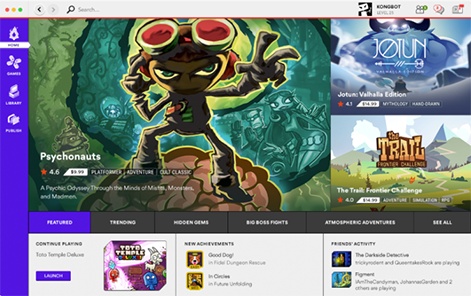Announced earlier this year, Kongregate's new Kartridge PC games platform has been in the works for about two years.
The firm began its plans for this new storefront when it was still owned by previous corporate overlords GameStop. But last year Kongregate was acquired by Swedish entertainment giant Modern Times Group,
"MTG has been extremely enthusiastic about Kartridge," CEO Emily Greer tells PCGamesInsider.biz.
"It was something that was definitely something they were interested in through out the acquisition process with the esports in their portfolio. They have a lot of faith in the PC market as a robust and healthy one, long-term. So they were very supportive of us working on Kartridge. Since the acquisition, we have been able to staff up the project and accelerate it in many different ways. Overall, in an environment with an appetite for investment in these particular kinds of things, which was definitely less the case under GameStop."

Kartridge was revealed in March, with Greer saying that the reception to Kongregate's vision of a PC games storefront has been remarkably positive. The exec claims developers really want an alternative to the current market leader, Steam.
"We expected people to be more cynical about whether anyone has a chance of competing in this market, one that's so dominated by Steam," she says.
"The general attitude that we have and the reception we've had from developers is that they would really like for there to be a significant second platform and they see us as having as good or better a shot at it and making it happen than anybody else given our combination of experience and resources. We've heard a lot of people say they really trust us to treat developers right and focus on community. That's one of the things we've heard from developers; the focus on creating positive community is something they're very interested and excited about.
"Every game developer knows how important community is to the long-term health of games, but they also feel pretty beaten down by their interaction with fans. It's a really challenging problem and we can't promise to get it perfect all the time but we do have experience running a platform with open chat for ten years and keeping it relatively healthy. We have a lot of experience and energy for creating positive experiences for everybody."
Despite this desire, Greer says that she doesn't view Kartridge as a Steam competitor, saying that she wants the platform to be more than a mere place to buy games.
"We focus on Kartridge being more of an experience, a platform and - in a way - a game itself," she says.
"The PC world doesn't need another storefront where all you do is shop for games. Even besides Steam, there's a lot of things like that. What we're focused on is having something that isn't just about buying games, but then the playing the game is a part of the experience of being on Kartridge. Consumers are earning platform achievements and have an account that is levelling up as you interact with the platform and is a deeper connection and a deeper meaning."
We are not going to try and compete with Steam on price. In any kind of sales event, of course, there will be discounting, but with things like Humble and the key resellers, there's already in some ways a race to the bottom. That's not a game we could win or want to win,
Kongregate launching Kartridge into an already solidified and established market is reminiscent of when the company first started as a Flash games platform. By Greer's own admission, the firm was "relatively late" to the party, but it still managed to carve out a niche for itself. So the company certainly has previous when it comes to wringing business out of established marketplaces.
"It was 2006, places like Newgrounds had been around for ages. There were 1,000 Flash sites that were somewhat indistinguishable from each other; they were very quickly put-together stores with collections of games - sometimes there legitimately, sometimes taken from other sites," she explains.
"We came in and it was a very different approach on browser and Flash games. Anybody could upload and there's chat and there's reviews and comments and it's a social experience that makes playing these small games larger than just that. Kongregate always had much better player retention and more visits per visitor when you looked at the stats compared to other sites because we were making the site a game itself and making everything bigger and richer. That's the approach we're taking with Kartridge."
One the key points of interest from the community upon Kartridge's announcement was whether the storefront would be using DRM. These tools were not mentioned in the initial announcement, but Greer says that - at least to start with - the platform would not be using DRM.
"It wasn't something we were pushing as a major differentiating factor, but philosophically we prefer DRM-free. It's both more player-friendly and from a developer standpoint, DRM is a lot of effort and we'd rather focus on other things," she explains.
"The basic feedback we are getting is that everyone is fine with DRM-free. There probably are developers form whom DRM is important and if we hear that over time then that might be something we can build in. We would hear it from developers and in that case it would be something we would turn on for the games where the developers wanted it. It's not a priority for us and it would be driven by developer demand because I'm sure that players are not going to demand it."

Greer also suspects that piracy might not be as big an issue for Kartridge as people believe; the platform is primarily focusing on indie games, which come with a lower price point and thus barrier to entry.
"If you look at the different motivations for piracy, there's time and convenience and ethics and various other things that factor in," she says.
"If someone is really determined to pirate something, they will eventually do it. When you look at independent games - which is where our initial focus is - they are cheaper and thus piracy is maybe less of an issue because it's less expensive. It's the $60 games that really have a barrier to a lot of people. We're not opposed to triple-A games coming to our platform, it's not our focus either."
One interesting aspect of Kartridge is that the platform is not going to be trying to compete with other storefronts like Steam on price. Asked about how it is approaching promotional events, Greer says that it isn't looking to do ridiculous sales - like the Steam sales; hated by developers by loved by consumers. Instead, she says Kartridge is interested in keeping the same price for games but adding more content and thus more value.
"We are not going to try and compete with Steam on price. In any kind of sales event, of course, there will be discounting, but with things like Humble and the key resellers, there's already in some ways a race to the bottom. That's not a game we could win or want to win," she says.
"We're focusing more on value and value around loyalty and other types of things. There's one approach to discounting, which is taking the price down. The other approach is to keep the price high and add more value. We're thinking about that in a platform level. The attitude that we're going to try and take where we're not trying to push prices down to compete, but trying to increase value to compete. That will take some different forms and that'll be something we'll probably have figured out the details of more and be able to talk about more later.
"In general, that's our attitude towards the space; increasing value rather than discounting."


















